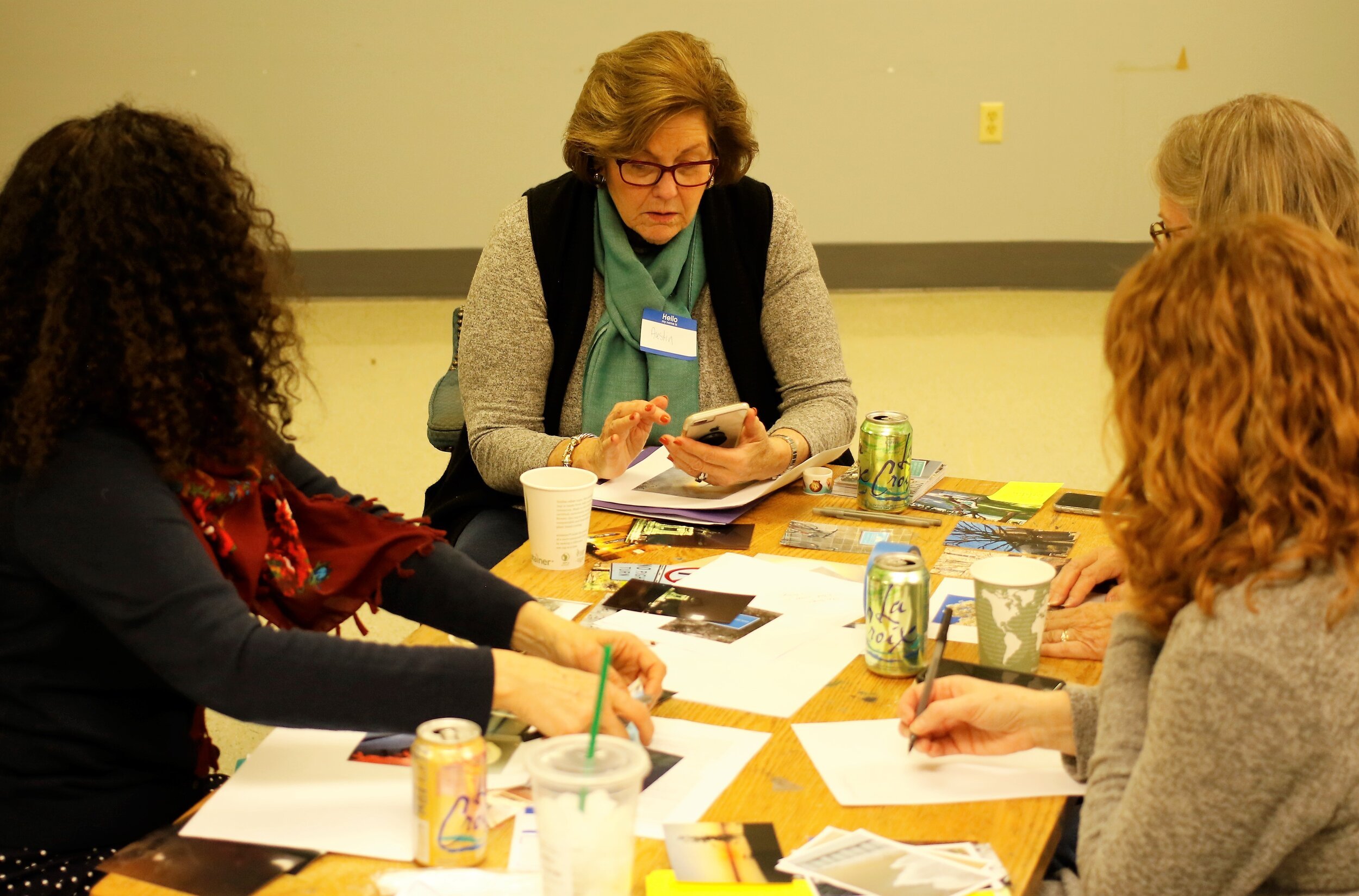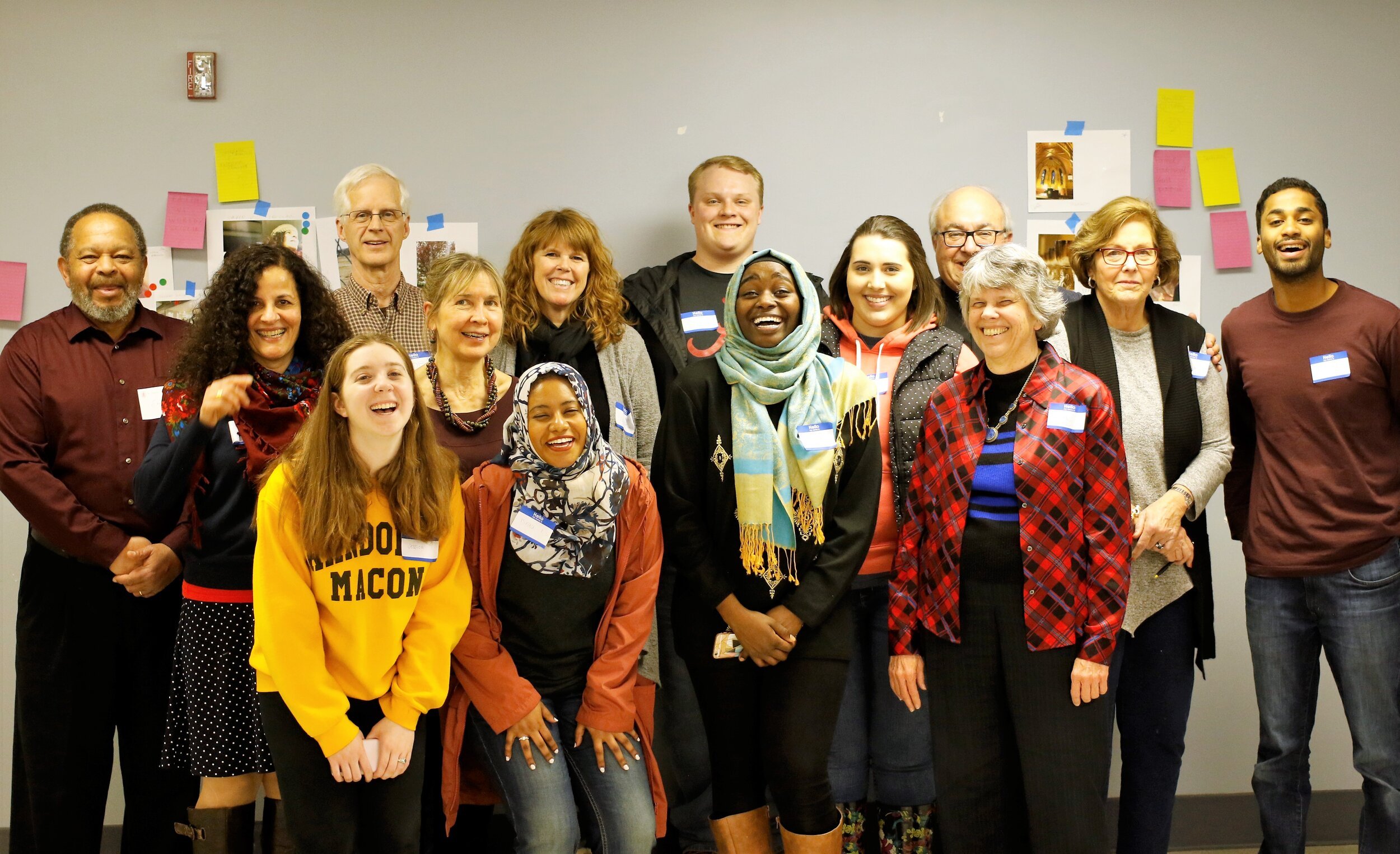In Memory of Elizabeth Austin Tucker
Elizabeth Austin Tucker, one of our beloved Interfaith Photovoice community members, suddenly passed away on August 4, 2021, at age 76. Her husband, Bill Sachs is a founding member of the Interfaith Photovoice team and Episcopalian priest, historian, and interfaith advocate, being the director of the Center for Interfaith Reconciliation, a center Austin worked with as well. We grieve with him and their entire family, including their daughter and grandsons: Elizabeth Sloan Smith and Thomas Turner Bruneau and Austin Boyd Bruneau for whom she was fondly named “Gigi.”
Photo 1. Austin shared about her experience with Interfaith Photovoice at the final exhibition of the Richmond project she participated in. This photo is from her interview during the exhibition.
Austin was a devout Episcopalian Christian. Austin and Bill traveled the world through their schooling, work, and interfaith engagement. She studied at Collegiate School and at La Chatelanie in Switzerland. In her travels, Austin journeyed through parts of Latin America, Asia, Africa, Europe, and, most of all, the Middle East, as she and Bill sought to learn about interfaith engagement. She did settle on one passion after a number of careers; she eventually began work as an interior designer, where her love of design really came alive.
We remember Austin for her life and laughter, and for her warm and thoughtful presence in our project in Richmond. Initially, she was reluctant to participate in our project, but she soon warmed to the idea. In an interview she said, “I was very reluctant. You [Roman Williams, founder of Interfaith Photovoice] gave us homework to show in our photography how certain things affected us or what they meant to us—and that made it a personal journey. I wish I could say that I had really devoted more time to it.”
Photo 2. Austin shares about her photograph in her small group during the Richmond project.
And by the time of our final exhibition, it was clear that Austin valued her experience:
Photovoice really made me stop and think about how we rush through our days and it made me stop and think, “. . . how am I gonna do that in a photograph?” . . . Bill and I have travelled the world, we've had lots of interfaith [experiences] with other religions. And for me, this was the first time that I saw people really opening up—just about their lives and their faith. Because Interfaith Photovoice gave a forum, an easy forum, really. If you had your photographs, and you explained them to your group, what they meant, it made you sort of articulate what you were trying to say in the photographs. And watching the younger people interact, I think, was amazing . . . So the accomplishment there, I think you've made friendships, I think you've made a community. I think you have people who hopefully will continue to meet with one another. It was a place to really reconnect with some of the people I haven't—some of the Muslim people I haven't seen in a long time. I just had been working so much. I'm ready to pull back and spend more time doing that kind of thing.
Those that knew Austin will remember that she sometimes wore a pair of glasses in which one lens was square-shaped and the other was round. Like the glasses she wore, she was able to help others see through different lenses. Her photos from our Richmond exhibit are an example of this wonderful ability to bring different perspectives into dialogue. One picture reflected on the brokenness of the world and the other expressed her conviction that God’s presence can shine into this brokenness to provide us with hope.
This first photo she shared is a reflection on the legal system and the kinds of discrimination that exist that keep people from moving forward in their lives. She titled this photo: Some Days You Just Can’t Win.
Photo 3. “Reminded me that not all are equal in the eyes of the law. Discrimination is still so prevalent.” (Austin)
Photo 4. “The church steeple surrounded by the sun reminded me that even though we sometimes forget, it is possible to see the light of God. Sometimes it breaks into our lives.” (Austin)
So much of Austin’s own reflections on her experience with Interfaith Photovoice surrounded the meaning of community and the beauty she found in forming fellowship with the other participants in the Richmond project. She shared her hope to make more time for this kind of dialogue and community formation, and did so in various ways because she was excited by the depth of conversation and meaning found through interfaith relationships:
I learned that people can sit down, and if they're given a question or a task, they can talk about it in an easier way if they have that something they're focusing on. And particularly the whole faith issue. Because you know, Episcopalians don't talk about their faith. . . . But I have always found that Muslims are very articulate and can talk about their faith. But on a different level . . . a deeper level.
She especially was touched by the sharing of the younger people in her group. One of Austin’s favorite memories from the project was of a young woman in her group that shared about what faith is to her. Austin explains, “she talked about how our view of faith is sometimes restricted. But behind that, every day, the sun comes up, and when you can see through the slats, it is more confirmation of your faith.”
Photo 5. Austin is standing on the far right, second person in, next to her husband, Bill Sachs.
You can read more about Austin’s beautiful life and passions by seeing her obituary. There you can find where to give gifts to the family as well: https://www.bennettfuneralhomes.com/obituary/elizabeth-austin-tucker





